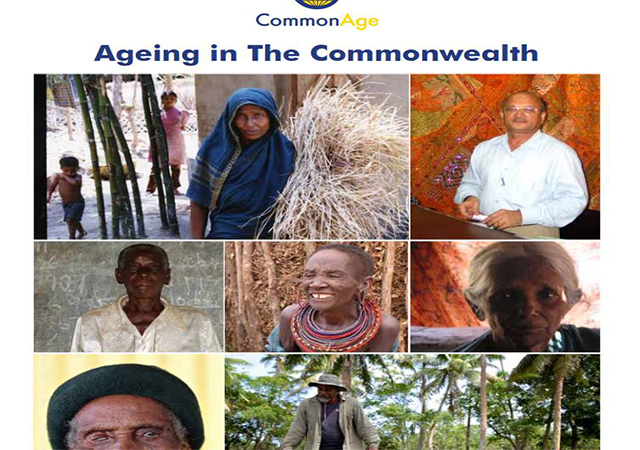 The 'Ageing in the Commonwealth' report will be presented at the inaugural Commonwealth Elders' Forum. [Report cover from Common Age]
The 'Ageing in the Commonwealth' report will be presented at the inaugural Commonwealth Elders' Forum. [Report cover from Common Age]
There has long been an emphasis put on young people as the future of the Commonwealth. Understandably so, with more than 60% of the Commonwealth’s 2.4bn population aged 29 or under. But perhaps the organisation should be focusing as much on the proportion of the older population in member states. The question of whether older people can look forward to an adequate income, good health, access to care and social inclusion will be an increasingly urgent one in the coming decades.
In the first study of its kind, researchers at Oxford University have examined how the demographics and challenges of ageing vary across the Commonwealth. The report, ‘Ageing in the Commonwealth’, aims to provide a baseline of strong evidence for the organisation to measure any progress and report to future Commonwealth summits.
The research project, carried out by the Oxford Institute of Population Ageing for the Commonwealth Association for the Ageing (CommonAge), found that despite the huge diversity of population dynamics across the Commonwealth, in all but Lesotho and Mozambique (both hard hit by HIV) the older population is predicted to grow more quickly than the total population. ‘Thanks to improved healthcare systems, longevity is increasing in the Commonwealth, but many older people are experiencing increasing frailty and loneliness and may not necessarily be enjoying their extra years of life,’ the Oxford Institute said.
Writing in the Guardian, Ken Bluestone, head of policy for Age International, said that across the Commonwealth the absolute size of the older population would at least double over the next 25 years. ‘And the fastest-growing segment of the population is the oldest old – those aged 80 and over.’
It is not just countries with large numbers of healthy baby-boomer retirees – such as the UK, Canada and Australia – that will see a larger share of older people in their populations; countries such as Antigua, Mauritius and Sri Lanka are among the Commonwealth’s fastest-ageing countries. The member state forecast to be the first to have more than 15% of its population being over 65 is Malta. Apart from Pakistan, the slowest-ageing countries in the Commonwealth – where a high birthrate compensates for the rapidly ageing population – are all in sub-Saharan Africa or the Pacific Islands.
But the report warns: ‘Even in those countries where co-residence with adult children is still the most common living arrangement for older people, the assumption of the availability of this kind of support as a basis for policy is increasingly out of touch with the realities of demographic and social change.’
CommonAge will present its research at the inaugural Commonwealth Elders’ Forum at the Commonwealth Heads of Government Meeting (CHOGM).



